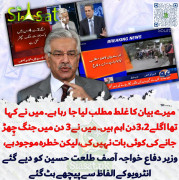Re: Turkish Muslims Will Be Allowed To Pray Only Three Times A Day ????
I am afraid that some times things are not presented in proper references and wrong message come out of them.
The al-Azhar Alim never said it is "
Prohibited" to pray 5 times. No, but he said to offer 5 prayers but it is allowed to do it during 3 times.
The best view I have found is of Maulana Ishaaq as has been posted above in the Video by brother Mughal. Maulana Madni told that all Shia Mujhtahideen agree with it that offering all 5 prayers in their due times is better, but one is fully allowed to join them. I have checked the fatawa of Shia Mujhtahideen and found the very same thing.
Direct proofs from Quran and Sunnah are as under.
Allah (swt) says in Quran:
"Establish regular prayers at the Sun's decline till the darkness of the night, and the recital of the Quran in the morning prayer; for the recital of the dawn is Witnessed.”
Qur'an 17:78
Here Quran is mentioning 3 timings.
- Sun's Decline
- Darkness of the Night
- The Morning Prayer.
Imam Fakhruddin Razi, the famous commentator on the Qur'an, wrote regarding the verse quoted (Chapter 17, Verse 78):
??? ????? ????? ????? ??? ?????? ??? ????? ????? ?? ??? ?????? ???? ??? ??????? ???? ??????? ?? ????? ????? ????? ??? ?????? ???? ??? ?????? ???? ????? ???? ????? ?? ???? ?????? ????? ????? ?????? ????? ??? ????? ??????? ??? ????? ???????? ??? ???? ??? ?????? ????? ?????? ??????? ????? ??? ????? ??????? ????? ??? ????? ???????? ???? ????? ???? ????? ??? ????? ?????? ???? ?????? ??????? ?????? ??? ??? ?? ?????? ??? ?? ????? ?? ????? ?? ??? ??? ??? ???? ???? ?? ???? ????? ?????? ???? ????? ???? ????? ?????
"If we interpret the darkness (ghasaq) as being the time when darkness first appears then the term ghasaq refers to the beginning of Maghrib. On this basis, three timings are mentioned in the verse: 'the time of noon, the time of the beginning of Maghrib and the time of Fajr'. This requires that noon be the time of Zuhr and `Asr, this time is shared between these two prayers. The time of the beginning of Maghrib is the time for Maghrib and 'Isha' so this time is also shared between these two prayers. This requires allowing the combining between Zuhr and `Asr and between Maghrib and 'Isha' at all times. However, there is proof to indicate that combining whilst at home without any excuse is not allowed. This leads to the view that the combining be allowed when travelling or when there is rain etc."
It is reported in Sahih Bukhari that Ibn Abbas [r] said:
“I offered eight rakahs (Zuhr and Asr) and seven Rakahs (Maghrib and Isha) at a time with Holy Prophet (s) (with no non-obligatory prayers in between.)” Umru says that he said to Abul Shaqa: “I think Holy Prophet (s) offered Zuhr a bit late and Asr a little earlier, and Isha a little earlier Maghrib a bit late, Abul Shaqa replied that he felt the same thing.”
Sahih Bukhari Volume 1, Book 10, Number 537, Chapter Times of the Prayers:
Narrated Ibn 'Abbas:
the Messenger of Allah (may peace be upon him) observed in Medina seven (rak'ahs) and eight (rak'ahs), i. e. (combined) the noon (Zuhr) and afternoon (`Asr) prayers (eight rak'ahs) and the dusk (Maghrib) and night ('Isha') prayers (seven rak'ahs).
While commenting on this tradition, on the same page of Tayseer al-Bari, Allamah Waheed uz Zaman says:
“The tradition is quite clear that two prayers can be offered at a time. A second tradition tells us about an incident in Madina when neither there was any fear nor any compulsion. It has already been mentioned above that Ahl e Hadeeth consider it permissible, and in the books of Imamia there are many traditions from Imams of Hadeeth in the chapter of joining [prayers] and there is no reason for these traditions being incorrect”
Sahih Bukhari Volume 1, Book 10, Number 518:
Narrated Ibn 'Abbas:
"The Prophet prayed eight Rakat for the Zuhr and 'Asr, and seven for the Maghrib and 'Isha prayers in Medina." Aiyub said, "Perhaps those were rainy nights." Anas said, "May be."
In the Urdu commentary Tayseer al-Bari Sharh Sahih Bukhari, while commenting on the last phrase of Jabir wherein he guessed that it could have been a rainy night, Allamah Waheed uz-Zaman writes:
“Jabir’s words are based on probability, its falsehood has been proven by Sahih Muslim’s tradition which states that neither was it rainy nor did any fear exist.”
Maulana Waheed uz-Zaman further writes:
“Ibn Abbas in another tradition says that Holy Prophet (s) did that in order to save his Ummah from any sort of difficulty.”
Imam Ahmad bin Hanbal records in his Musnad:
The Prophet (s) prayed in Madinah, while residing there, not travelling, seven and eight (this is an indication to the seven Raka't of Maghrib and 'Isha' combined, and the eight Raka't of Zuhr and `Asr combined).
Ahmad ibn Hanbal, al-Musnad, Volume 1, page 221
And Imam Malik also recorded it in his Muwatta:
“The Prophet (s) prayed Zuhr and `Asr in combination and Maghrib and 'Isha' in combination without a reason for fear or travel.”
Malik ibn Anas, al-Muwatta', Volume 1, page 161
Now let us have a look at a tradition from Sahih Muslim:
Ibn 'Abbas reported that the Messenger of Allah (s) combined the noon prayer with the afternoon prayer and the sunset prayer with the 'Isha' prayer in Medina without being in a state of danger or rainfall. And in the hadith transmitted by Waki' (the words are): “I said to Ibn 'Abbas: What prompted him to do that? He said: So that his (Prophet's) Ummah should not be put to (unnecessary) hardship.”
This tradition is found in the following sources:
- Sahih Muslim (English translation), Kitab al-Salat, Book 4, Chapter 100 Combination of prayers when one is resident, hadith no. 1520;
- Jami al-Tirmidhi, volume 1, page 109, translated by Badee’ uz-Zaman, published by No’mani book store, Urdu bazaar Lahore.
- Sunan Abi Daud, volume 1, page 490, Chapter: 'Combining of Salat', translated by Maulana Waheed uz-Zaman
In his commentary of this tradition, Allamah Wahid-uz-Zaman states:
There are two types of combination of prayers, Jama’ e Taqdeem and Jama’ e Takheer, the earlier one means to offer Asr at the time of Zuhr and Isha at the time of Maghrib, and the later type is to offer Zuhr at the time of Asr and Maghrib at the time of Isha, both the types are proven to be valid from Prophetic Sunnah.
Sunan Abu Daud, volume 1, page 490, translated by Maulana Waheed uz-Zaman, published in Lahore
Maulana Waheed uz-Zaman concludes the discussion on the same page by stating:
“The arguments against combining the prayers are weak, whilst those permitting it are strong.”
Sunan Abu Daud, volume 1, page 490, translated by Maulana Waheed uz-Zaman, published in Lahore
Shah Waliullah Dehalwi stated in Hujutallah Balagha, page 193:
The timings of prayers are actually three i.e. morning, Zuhr and the time in the darkness of night and this is the meaning of Allah’s statement ‘Keep up prayer from the declining of the sun’. And he stated ‘till the darkness of the night’ because the time to perform Zuhr prayer is spread till sunset as there isn’t any distance between the two, thus, in necessity, it is permissible to combine Zuhr and Asar and Maghrib and Isha prayers’
About Hazrat Abu Hurairah regarding the permissibility of combining prayers, it is written in Musnad Ahmed:
Abdullah bin Shaqiq narrated that once after the Asr, Ibn Abbas addressed till the sun set and the stars appeared, thus the people said: 'The prayer' and among the people there was a man belonged to Bani Tamim (tribe) who said: 'Prayer, prayer'. Then he (Ibn Abbas) became angry and said: 'Would you teach me the Sunnah!! I saw Allah's messenger (pbuh) combining the Zuhr and Asr, and Maghrib and Isha'. Abdullah (bin Shaqiq) said: 'I had doubt on that matter thus I met Aba Huraira and questioned him and he agreed with him (Ibn Abbas)'.
Shaykh Shu'aib al-Arnaout said about this tradition:
'The chain is Sahih according to Imam Muslim's standard'.
Among Sahaba, Anas bin Malik also testified it.
Sahih Bukhari Volume 1, Book 10, Number 524:
Narrated Abu Bakr bin Uthman bin Sahl bin Hunaif:
that he heard Abu Umama saying: We prayed the Zuhr prayer with 'Umar bin Abdul Aziz and then went to Anas bin Malik and found him offering the Asr prayer. I asked him, "O uncle! Which prayer have you offered?" He said 'The Asr and this is (the time of) the prayer of Allah s Apostle which we used to pray with him."
Therefore, these Al-Azhar or Turkish Imams are not talking some thing new, but according to present day situation and lack of time, they are trying to convince people that it is also allowed practice to combine the prayers if needed. .... and none of them is telling that is is "
Prohibited" to offer 5 times.































